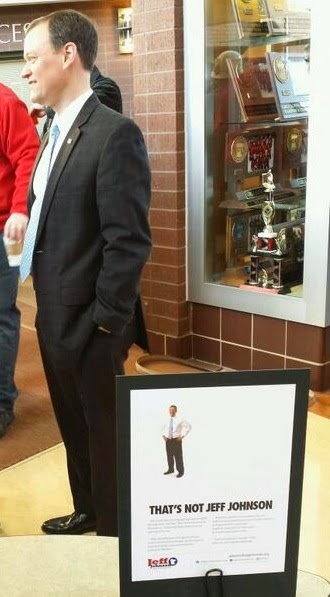Since February it has been clear that the Jeff Johnson for Governor campaign has been losing steam. After taking an early lead in a State Central straw poll at the end of 2013, Johnson finished a distant third place in the caucus night straw poll, and then turned in the lowest fundraising total of any major campaign for Governor in the first quarter, raising about half of what his closest competitor raised.
Johnson has struggled to find a running mate, and this week, only days before the endorsing convention, hastily announced that Bill Kuisle, a former legislator from the Rochester area will join his ticket. Nobody can credibly make the argument that Kuisle was Johnson's first pick for Lieutenant Governor, and Johnson's team is not even trying.
One of the reasons that I soured on the Johnson campaign early was that Johnson and his staff displayed what I felt to be an oversensitivity and thin-skinnedness that signaled that they were not ready to compete in a statewide race.
As an example, when questions were raised about Johnson's support of the Kingfish program in Hennepin County, Johnson ended his explanation with this passage:
Given the negative “gotcha” direction this endorsement campaign has taken in the past couple weeks, I suspect that even as I write there are political operatives digging for dirt.
Based on the push-back from Team Johnson recently, the following topics are out-of-bounds or invalid: Johnson's voting record, Johnson's electoral record, Johnson's fundraising results or lack thereof, Kuisle's voting record, Kuisle's electoral record, and the list goes on. Team Johnson has shown consistently that they just don't think that any criticism of their candidate is fair.
In the wake of the Kuisle pick, a number of Johnson supporters have stepped up their push-back on social media against blog posts that they feel do not reflect their campaign in a good light. However, nobody from Team Johnson has indicated which facts are incorrect in these blog posts. Instead, they try to discredit the writers through innuendo.
Johnson campaign advisor and his assistant at Hennepin County Danny Nadeau got things started by posting this to Twitter a few days ago:
The quality of journalism v the gossip of bloggers is so clearly evident today. Just because you hear something does not make it so.This is quite a different take than what Johnson himself wrote last July when he invited me to an event for bloggers:
— Danny Nadeau (@NadeauDanny) May 21, 2014
Despite what many in the mainstream media wish, bloggers are journalists, and my campaign intends to treat Minnesota bloggers like we treat the traditional media.
Not content to be quite so subtle, Johnson supporter Jeff Bakken took things to the next level a few days later:
.@mbrodkorb and @jpkolb: Odd that two of biggest @ScottHonourMN fans on Twitter are both personally obsessed w/attacking @Jeff4Gov.
— Jeff Bakken (@jeffbakken) May 22, 2014
A few tweets before that, Bakken explicitly accused Scott Honour campaign manager Pat Shortridge of secretly funneling money to blogger Michael Brodkorb for research.
Note that Bakken, like other Johnson supporters or staffers, did not point out any specific areas where blog posts they didn't like were factually inaccurate. Instead Bakken and Nadeau were employing that time honored tradition of trying to discredit the messenger. Specifically in this instance implying that any analysis that paints Johnson in a bad light is because the writer is a secret paid agent of a rival campaign.
I have been very clear who I am supporting in contested elections this year. I disclose this information in my Twitter bio, and here on my blog in the sidebar. In an earlier blog post I indicated some of my reasons for not supporting Johnson. I have never knowingly posted incorrect information on my blog, and if I was requested by a campaign to note an objection I would do so.
I spoke to Brodkorb for this story and he confirmed for me that 1) He has not done any paid political work for any MN candidate this election cycle and 2) Johnson's campaign has never asked him to print a correction or indicated any factual deficiency in a post he has written. He also pointed me to his blog's About page where he lists his policy on disclosure for paid work.
While I am disappointed that Johnson's campaign has employed these discredit the messenger tactics, I certainly understand why they did. Campaigns are in the business of getting their candidates elected, and controlling the information available about your candidate is an important part of the process. When you don't have the option of rebutting the facts at hand, you have very few options left but to attack the messenger.
The bottom line: Johnson's campaign is lashing out at critics because they know what is being said is true, not because it isn't.
